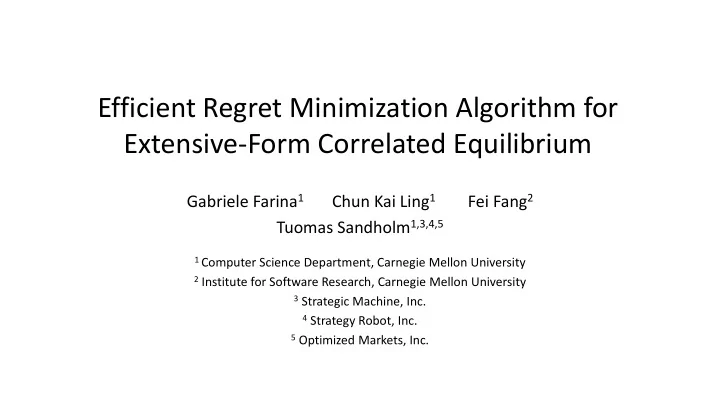

Efficient Regret Minimization Algorithm for Extensive-Form Correlated Equilibrium Gabriele Farina 1 Chun Kai Ling 1 Fei Fang 2 Tuomas Sandholm 1,3,4,5 1 Computer Science Department, Carnegie Mellon University 2 Institute for Software Research, Carnegie Mellon University 3 Strategic Machine, Inc. 4 Strategy Robot, Inc. 5 Optimized Markets, Inc.
Extensive-Form Games • Can capture sequential and x y simultaneous moves • Private information • Each information set contains a set of “indistinguishable” tree nodes • We assume perfect recall: no player forgets what the player knew earlier
Extensive-Form Correlated Equilibrium (EFCE) • Introduced by von Stengel and Forges in 2008 • Correlation device selects a recommended strategy for each player before the game starts – The correlated distribution of strategies is known in advance to all players • Recommendations are revealed incrementally, move by move, as the players progress in the game tree – A recommended move is only revealed to the acting player when the player reaches the decision point for which the recommendation is relevant – Players are free to not follow the recommendation, at the cost of future recommendations
Extensive-Form Correlated Equilibrium (EFCE) • An optimal (e.g., social-welfare-maximizing) mediator that is provably incentive-compatible can be constructed in polynomial time in two-player general-sum games with no chance moves [von Stengel and Forges, 2008] – Players can be induced to play strategies with significantly higher social welfare than Nash equilibrium… – … despite the fact that each player is free to not follow the recommendations – Added benefit: players get told what to do---they do not need to come up with their own optimal strategy as in Nash equilibrium
Computing EFCEs • Original formulation [von Stengel and Forges, 2008] is based on linear programming – Does not scale beyond toy problems – Prohibitive amount of memory (>500GB for a game with 1M sequences per player) • Another paper of ours in NeurIPS-19 (“Correlation in Extensive -Form Games: Saddle- Point Formulation and Benchmarks”) formulates the problem as a bilinear saddle point problem and proposes a method based on projected subgradient descent – Transforms problem into a zero-sum game between a mediator and deviator, the latter of which is finding the worst possible deviation by the players for the given correlation plan given by the mediator – Scales better than an LP, but still faces issues with large games. The main hurdle is the projection onto the set of feasible EFCEs
Regret minimization has become a standard module in leading approaches for finding Nash equilibrium in very large, zero-sum extensive form games [Bowling et al. Science 2015; Moravcik et al. Science 2017; Brown and Sandholm, Science 2017&2019] Q: Can regret minimization be used to compute optimal EFCEs in two-player games without chance moves?
A: Yes. We give the first efficient regret minimization algorithm that operates on the set of correlation plans • Significantly more complicated than the Nash equilibrium case – The constraints that define the set of correlation plans lack the clean, hierarchical structure of sequential strategies – The constraints form cycles!
Ingredient 1 : Scaled Extension • Powerful operation for constructing certain structured sets, including strategy spaces. We use it to construct the space of EFCEs • Idea: extend 𝒴 with a scaled version of 𝒵 • Scaled extension preserves convexity and compactness of 𝒴 and 𝒵
Ingredient 2: Correlation plans as composition of scaled extensions • Some of the constraints that define the space of correlation plans are redundant and can be safely eliminated • We propose an algorithm which can safely identify which of these constraints are redundant and removes them • The remaining constraints form a tree • The set generated by the remaining constraints can be equivalently generated by composing several scaled extension operations
Ingredient 3 : Regret Circuits [Farina, Kroer, Sandholm ICML’19] • General methodology for constructing regret minimizers obtained from convexity- preserving operations – Given regret minimizers for convex sets 𝒴 and 𝒵 , can we compose them and construct a regret minimizer for, say, the convex hull/Cartesian product/intersection of 𝒴 and 𝒵 ? • In this NeurIPS-19 paper we construct a regret circuit for the scaled extension operation
Summary of main contributions • We introduce scaled extension , a novel convexity-preserving operation between sets • For games with no chance: space of correlation plans may be constructed top down using a series of scaled extension operators • We show that an efficient regret minimizer for the scaled extension of two sets can be constructed starting from any regret minimizer for each individual set – Regret circuit approach as in Farina, Kroer, Sandholm [ ICML’19] • Therefore: optimal EFCEs in two-player games without chance can be computed using regret minimization – Much faster than subgradient descent – Does not need projections: it is guaranteed to always produce feasible iterates
Recommend
More recommend